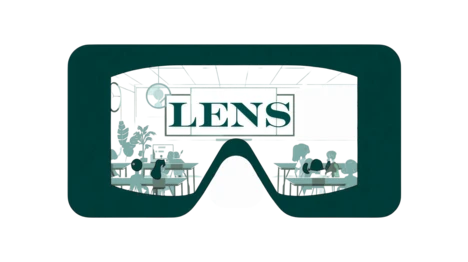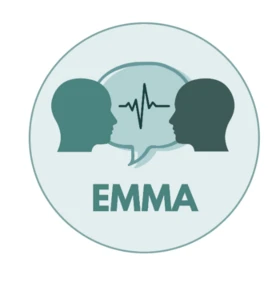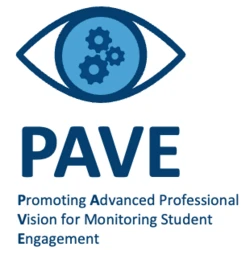
What is the research topic?
Research findings from expertise studies show that experienced teachers perceive and interpret teaching situations differently than their less experienced colleagues. Eye-tracking studies illustrate that they process information faster, have a broader field of vision, and interpret teaching situations in a more differentiated manner. The LENS project in Transregio 419 SHARP investigates how expert modeling can be used to specifically promote the professional perception of complex teaching situations. Professional perception describes the ability to identify and interpret relevant events in the classroom and to derive pedagogical decisions from them. With the help of modern eye-tracking technology, expert examples are integrated into simulations and students learn what to pay particular attention to when diagnosing important learning prerequisites. Furthermore, the project uses the latest advances in AI-based research methods to empirically investigate the effectiveness of personalizing these simulation trainings in a series of studies.
What is special about this project?
The project combines eye-tracking research with personalized simulation training to support student teachers in developing professional vision. In various training conditions, participants receive so-called Eye Movement Modeling Examples (EMMEs), in which the eye movements of experts are presented as a model.
These are combined with additional personalized learning aids, such as adaptive feedback or reflection guides. By comparing personalized and standardized forms of support, the project investigates how individual learning processes can be optimally promoted and whether personalizing learning models leads to a significant improvement in learning success and subsequent implementation.
What do we want to achieve with this project?
The aim of LENS is to gain a deeper understanding of how teachers control their visual attention in complex teaching situations and how this skill can be specifically trained through personalized simulations. The results contribute to the further development of theoretical models of professional perception and the design of personalized training approaches for teacher education. In the long term, the project aims to show how technology-supported, adaptive learning environments can contribute to the sustainable improvement of diagnostic competences and teaching decisions.
Project name: LENS (SHARP/C01)
Research group: DFG-Projekt (Transregio TRR 419)
Funding: Deutsche Forschungsgemeinschaft (DFG)
Duration: 02/2025 - 01/2029
Head: Prof. Dr. Tina Seidel
Staff: Prof. Dr. Maria Bannert, Alina Kreitmaier, Deisy Montenegro Briceno
Email: lens.paedpsych(at)sot.tum.de

What is the research topic?
Project EMMA is advancing our knowledge of how medical students learn about the key elements necessary for successful ward round communication. The project achieves this by studying and testing personalized and simulation-based digital learning materials. These are designed to foster medical students' Advanced Professional Vision (aPV) in professional ward round interactions, effectively using Eye Movement Modelling Examples (EMMEs) as key scaffolding tools.
Clinical ward round communication is an essential aspect of patient care. Physicians must observe the clinical situation to adapt their communication and decision-making accordingly, ensuring that patient needs are met and the healthcare team is aligned. Previous findings from expertise research indicate that experienced physicians often perceive and interpret clinical situations more efficiently than novices. Eye-tracking studies show that experts utilize faster visual information processing and select relevant information more broadly and holistically. With the help of EMMEs, students gain direct insight into expert practice. These specialized video simulations show a leading physician's communication process alongside their visual gaze patterns and verbal reasoning, highlighting the important cues to notice during ward rounds.
What is special about this project?
To maximize the effectiveness of the simulation-based digital learning environment, the research is structured as a series of four interconnected studies. Study 1 establishes the necessary benchmark by precisely mapping the expert-novice differences in Advanced Professional Vision (aPV) during ward round communication. Study 2 investigates which visual scaffolding within EMMEs is most effective for learning by comparing the effectiveness of EMMEs that display raw gaze fixations versus attention maps. Study 3 tests the efficacy and optimal modality of personalized feedback generated by Large Language Models (LLMs), a type of artificial intelligence trained to understand and generate human-like text. This study assesses whether textual, visual, or combined feedback on students' written analyses of ward round quality best improves their understanding. Finally, Study 4 assesses the added value of knowledge-activation prompts as a scaffolding tool within the EMME simulation to enhance the learning process.
What do we want to achieve with this project?
The primary goal of Project EMMA is to enhance medical students' learning and professional vision for communication in ward rounds. The findings will clarify expert-novice differences and identify the most effective EMME format for personalized learning in simulations. Crucially, the project will create and validate a highly effective personalized LLM-based feedback system and clarify the contribution of knowledge-activation prompts to design personalized simulations. This will lead to a more effective simulation-based learning environment for medical students.
Project name: EMMA (SHARP/C03)
Research group: DFG Sonderforschungsbereich SHARP (TRR 419)
Funding: Deutsche Forschungsgemeinschaft (DFG)
Duration: 10/2025 - 06/2029
Heads: Prof. Dr. Tina Seidel, Prof. Dr. med. Pascal Berberat, Prof. Dr. Martin Gartmeier
Staff: Dr. Christian Kosel, Göksu Kahraman, Kathleen Vogt
Email: emma.paedpsych@sot.tum.de

What is the research topic?
Classroom dialogues are a widespread teaching practice. In these discussions, teachers must observe what is happening in the classroom so that they can adapt their teaching approach if necessary to ensure that all students are included. Previous findings from expert research indicate that experienced teachers often notice and reason classroom situations differently than novices. Eye-tracking studies show that experienced teachers process information more quickly, have a broader visual field, and interpret situations in a more differentiated manner. Until now, this has been studied primarily in routine standard situations, although these alone do not reflect everyday school life. PAVE now focuses on whether these differences in expertise also manifest themselves in non-routine or problematic teaching situations and how they are reflected in visual attention allocation and reasoning. Data is collected using modern eye-tracking technology, which records where teachers look and how they distribute their attention.
What is special about this project?
The research project investigates the professional teaching vision of (pre-service) teachers when observing classroom dialogues.
The project is divided into two studies. Study 1 examines differences in expertise in the professional vision of routine and non-routine situations. Building on this, Study 2 empirically examines the extent to which professional vision can be enhanced through a training program. The training program consists of so-called Eye Movement Modeling Examples (EMMEs) with and without verbal expert self-explanations (VESEs).
What do we want to achieve with this project?
The goal of PAVE is to develop a deeper understanding of how teachers process different teaching situations and whether professional perception processes can be trained on the basis of expert modeling.
The results examine theoretical assumptions about professional vision and typical patterns in teachers' attention control in routine and non-routine situations. In addition, investigations are conducted into the trainability of professional vision in order to support pre-service teachers and experienced teachers in distributing their attention in the classroom in a more targeted and effective manner.
Project name: PAVE
Research group: DFG Projekt (545748309)
Funding: Deutsche Forschungsgemeinschaft (DFG)
Duration: 04/2025 - 03/2028
Head: Prof. Dr. Tina Seidel
Staff: Dr. Ricardo Böheim, Dr. Christian Kosel, Jasmin Heinrichs
Email: pave.paedpsych(at)sot.tum.de

The Clearing House Unterricht sees itself as a unique interface between educational research and educational practice and aimed at (prospective) teachers and teacher trainers in all phases of teacher training. Our goal is to summarize current scientific findings from research synthesis on effective STEM teaching in secondary schools and prepare summary materials, tailored to our target group. In this way, the Clearing House Unterricht makes an important contribution to improving and continuously expanding the scientific basis for teacher training and evidence-based teaching practices.
Particular focus is placed on future learning skills, which include communication, collaboration, creativity, and critical thinking. With this focus, we aim to support teachers in integrating these skills into their teaching, also with the help of digital media, to improve long-term student learning outcomes.
Funding: Wilhelm-Stemmer Stiftung
Duration: 10/2023 - 09/2029
Head: Prof. Dr. Tina Seidel
Staff: Begüm Arvaneh, Dr. Meg Farrell, Dr. Maximilian Knogler, Fabian Reinwarth, Sabrina Reith
Website: https://www.clearinghouse.edu.tum.de
E-Mail: clearinghouse.edu(at)sot.tum.de
Social Media: LinkedIn, Instagram, Bluesky, Mastodon

What is the research topic?
In today's society, the education system is facing a turning point: on the one hand, technological progress enables us to use digital media to optimize teaching and learning processes, and on the other hand, future members of society need digital skills to gain a foothold in our modern world of work and life. To this end, science provides practitioners with a wealth of insights into how digital media can be used effectively in schools and classrooms.
To ensure that these scientific findings are put into practice, the Research Field of Action within this project investigates the conditions for success that underlie the transfer of knowledge from science to practice and the coordination of action between groups of actors in the education system. The overarching goal is to support the orientation toward scientific findings in digitization-related teacher training and school development.
What is special about this project?
The Research Field of Action not only examines the transfer of knowledge between science and practice, but also plays an active role in its promotion. First, research syntheses on educational practices regarding digitization-related topics are created and published freely, with the topics being selected with reference to educational practice. These studies aim to provide overviews of the relevant research results for a given topic. In a next step, these research syntheses are co-constructively prepared with practitioners in a way that is tailored to the target group and their needs. This results in practice-oriented short presentations and transfer products (including short reviews, podcasts, etc.). At the same time, concrete communication formats are examined and developed in collaboration with practitioners. Training courses and dialogue events with teachers and teacher trainers are organized in order to make the knowledge of the research syntheses available to a wider audience. In addition, innovative digital methods are developed, such as automatic data analysis for research syntheses or online crowdsourcing procedures to determine the needs of teachers.
What do we want to achieve with this project?
The objectives of the Research Field of Action are closely linked to those of the overall Competence Network for Learning:Digital research project. In general, the aim is to provide scientifically sound information to support practitioners in addressing their questions and problems associated with digital aspects of teaching and learning. Formats based on this research are to be developed for the professionalization of multipliers in digitization-related continuing education and training for teachers. The Transfer Center and the Research Field of Action play a central role in ensuring that the findings generated in the Competence Centers of the project reach the relevant stakeholder groups in practice. At the same time, networks and best practices are to be developed that promote the transfer of knowledge from science to practice and secure it for the future.
Project name: Competence Network for Learning:Digital
Research group: Competence Network for Learning:Digital, Transfer centre, Research Field of Action
Funding body: NextGenerationEU, BMBF
Duration: 06/2024 - 06/2026
Lead: Prof. Dr. Doris Holzberger (TUM), Prof. Dr. Andreas Lachner (University of Tübingen), Prof. Dr. Tina Seidel (TUM)
Staff: Dr. Meg Farrell, Sabrina Reith, Fabian Reinwarth, Dr. Lisa Ziernwald, Georgios Mitsostergios, Linyuan Zhang
Completed Projects
An overview of all completed research projects of the chair can be found on the TUMFIS portal.